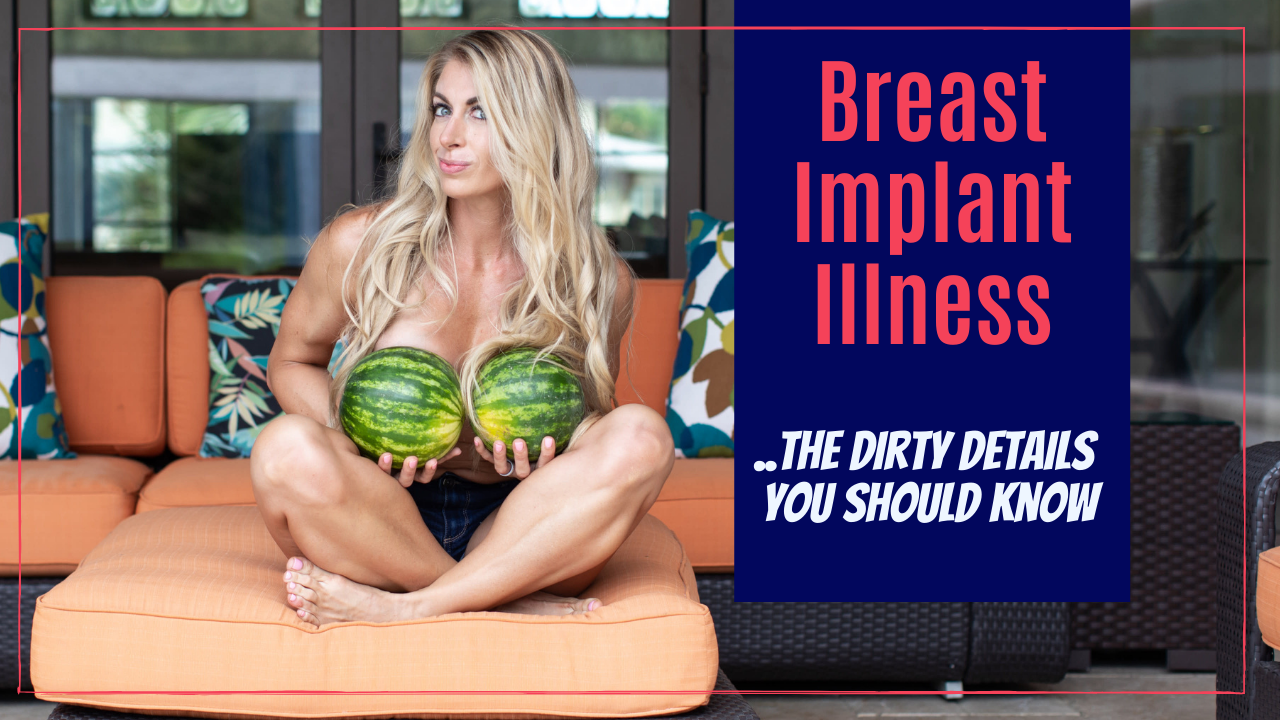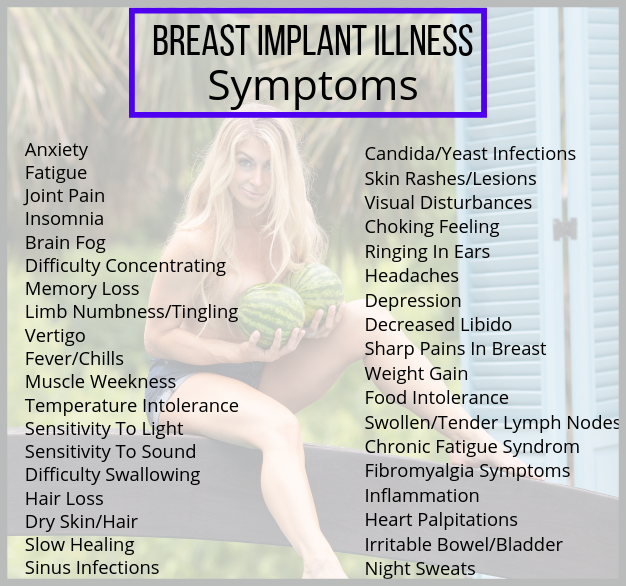
BOOBS! Breasts are that beautiful God-given curve that changes the silhouette of a woman, different from a mans.
We all love them. Well, okay let’s play fair here and say that most of us love them. So much so that a lot of time and energy can be invested with their appearance. Just walk into a bra shop and count the numerous ‘possibilities’ and you can agree with me. However, decades ago we stepped beyond the ‘padded bra’ to a more permanent fix.
Often times, when things seem too good to be true, that just might be the case. Let’s discuss it.
My intention in discussing this topic is to share factual evidence and points of consideration that are not swayed by my own opinions.
As women, we deserve to feel beautiful in our skin. Equally, we deserve to have information to make informed decisions that are best for our own personal health.
What Is Implant Illness
Breast Implant Illness (BII) is a hot topic of discussion. Breast Implant Illness (BII) is a self-identified diagnosis due to a large variety of symptoms that are experienced due to the presence of breast implants. By self-identified that means there isn’t a blood test or any other medically performed, conclusive test that can determine a positive result for Breast Implant Illness (BII).
Breast Implant Illness (BII) doesn’t seem to be attached to one type of implant. It doesn’t matter if the implant is filled with saline, silicone, gel, or play-doh. (they don’t actually do that…) there is no discrimination for symptoms of Breast Implant Illness (BII) based on brand and type of implants.
Implant Illness Symptoms

A Quick History Lesson
With growing medical technology we’ve taken matters into our own hands and BAM! We’ve created boobs. In 1962 the first breast augmentation was performed on Timmie Jean Lindsey, mother of six who went into the hospital to have a tattoo removed from her chest. It was at that time that 2 surgical doctors Frank Gerow and Thomas Cronin asked if she would consider volunteering for this, “first-of-it’s-kind” operation. She negotiated saying that if she had surgery on anything she would really like her ears to not stick out. The surgeons agreed to do both, they shook and had a deal. The rest is history…
The Statistics
Yet here we are 57 years later Breast Augmentations and Liposuction battle neck and neck for the annual leader in cosmetic surgery performed in the US. Making breast augmentations a billion-dollar industry and rising between 4-5% annually, totaling 313,735 in the US in 2018. (1) Of the total surgeries performed, 75% of them are on perfectly healthy breast, while the other 25% are reconstruction after mastectomy.
Safe Or Not Safe? That Is The Question…
Through the years a debate has spiraled around the safety of breast implants. Through these ebb and flow times, the medical field has certainly done its job in improving implant devices and substances that fill them. For any procedure, especially cosmetics, there are risks. The focal point of the FDA in disclosing the risks involved with Breast Implants was concentrated on:
- breast pain or hardness called capsular contracture
- implant rupture
- and cosmetic problems in the breast area
In 2011, the FDA announced that breast implants could be linked to causing ALCL, a rare type of lymphoma.
However, at this current time, the FDA states that breast implants do not cause connective tissue diseases, reproductive problems, chronic fatigue, or cognitive impairment issues. (2)
By the close of 2018, there were more than 50 thousand women as part of two Facebook social media groups: Breast Implant Victim Advocacy & Breast Implants Illness and Healing. These groups share their personal experiences and how their lives and bodies were effected by having breast implants.
Administrators and advocates of these groups met with FDA officials in a September 2018 meeting insisting on organization and completion of larger, long term studies of health problems that women experience as a result of their breast implants.
In November of 2018, the National Center for Health Research conducted an eye-opening study that began to provide some real numbers worth considering.
The study contained 300 women who had chosen to remove their breast implants. (explant) Here are some stats collected from this group:
- Less than 1/3 had implants that were ruptured.
- Over half of them remarked they had breast pain.
- 84% listed an array of other health issues that can be categorized as autoimmune or connective tissue symptoms.
- After explant, 89% reported their symptoms resolved or improved
There are hundreds of other shocking and sad stories of the evolution of implants. The first 30 years that breast implants were used, they weren’t studied in clinical trials. The modification of exterior coatings and internal fillings changes were the results of ‘failures’ that were experienced by patients. If you want to dig deeper into this mindblowing industry I suggest the article of reference #2.
Recent Recall On Brand And Type Of Implant
As of July 2019, a worldwide recall was announced by the FDA for Allergan, a large implant manufacturer, on their textured implants and their connection to (BIA-ALCL) breast implant-associated anaplastic large cell lymphoma. There are currently 573 cases worldwide and 33 deaths. (3)
“The specific textured breast implant products that have been recalled include Natrelle Saline-Filled breast implants, Natrelle Silicone-Filled breast implants, Natrelle Inspira Silicone-Filled breast implants, and Natrelle 410 Highly Cohesive Anatomically Shaped Silicone-Filled breast implants.
The recalled tissue expanders include the Natrelle 133 Plus Tissue Expander and Natrelle 133 Tissue Expander with Suture Tabs.” (3)
What To Do If You’re Considering Breast Implants
If I were considering going under the knife today to enhance my breast size or appearance here are the questions that I would SHAMELESSLY ask my surgeon:
- What brand and type of implant are you using?
- What material is your implant filled with?
- How long have they been on the market?
- Are you aware of any associated risks with the type and brand?
Then it is up to you to go home and research the type and brand and clinical trials. Make an informed decision.
I would also recommend highlighting on the chart above of any Implant Illness Symptoms you experience PRIOR to your implant surgery. That way you can clearly see if symptoms occur AFTER implants.
What To Do About Your Implants If You Already Have Them
Know the brand and type of implant you have. Pay close attention to health news that applies to your type of device.
Experiencing Implant Illness Symptoms? Considering Explant?
If you are experiencing implant illness symptoms from mild to life-altering, go and consult with a professional. The only way to truly know if your implants are responsible is to have them removed.
Find a surgeon who specializes in explant and capsule removal. https://www.breastimplantillness.com has a full list of experts by state.
Ask about recovery time and if drains will be placed. (4)
What Is Implant Illness – Conclusion
In my opinion (we are back to my opinion, LOL) your own personal health isn’t just physical. Your own personal health is multi-dimensional and it holds your mental-emotional well being at an equal value of your physical.
Therefore, my desire in providing this information is so that you can make the best-educated decisions for your own personal health and happiness.
Sources
- https://plasticsurgery.org/documents
- http://www.center4research.org/breast-implant-illnesses-whats-evidence/
- https://www.cnn.com/2019/07/24/health/breast-implant-recall-allergan-fda-bn/index.html
QUESTIONS?
As always, I’m happy to answer.

